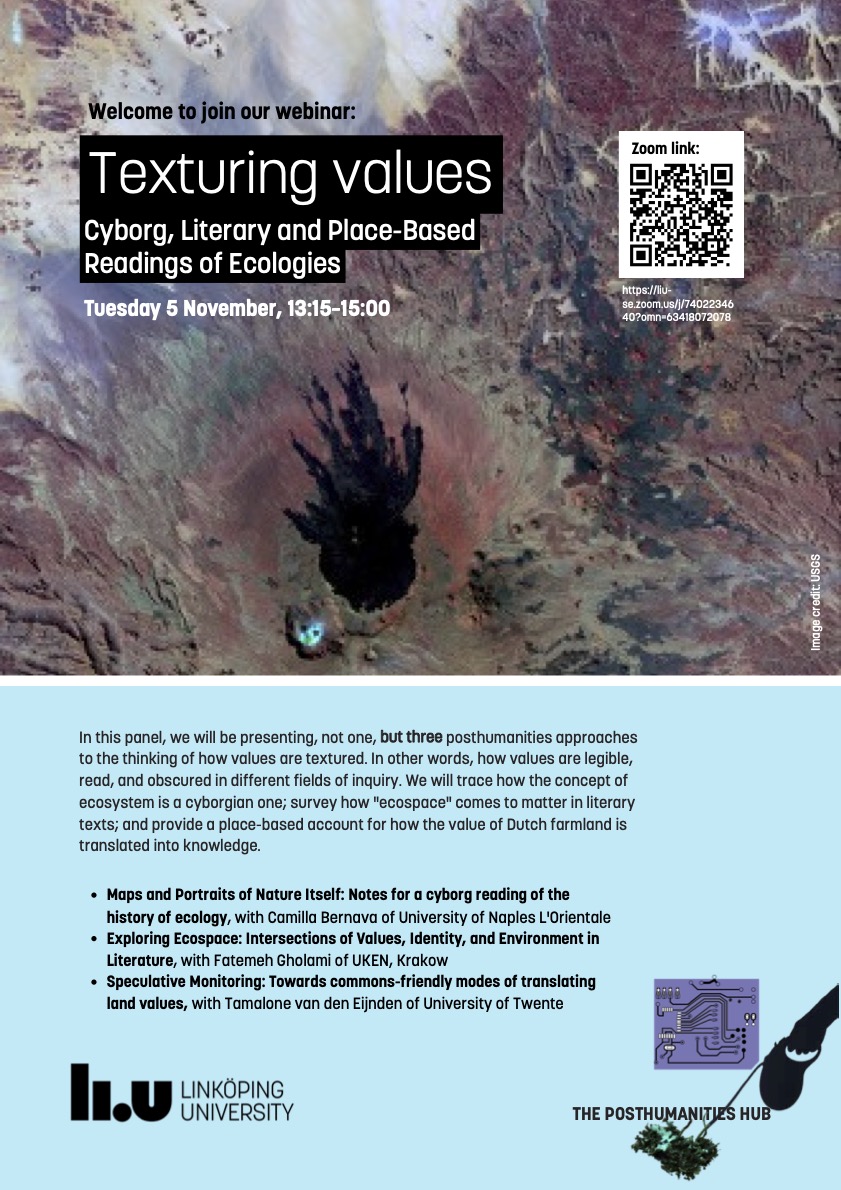
- This event has passed.
The Posthumanities Hub webinar 5/11: Texturing values: Cyborg, Literary and Place-Based Readings of Ecologies

Dears!
Do not miss out on this incredible webinar with our three magnificent guest researchers; Camilla Bernava (UniOr, IT), Fatemeh Gholami (UKEN, PO) and Tamalone van den Eijnden (UTwente, NL). It takes place on Zoom (link below), at 13.15-15.00 CET on Tuesday 5th of November. Enjoy!
Maps and Portraits of Nature Itself: Notes for a cyborg reading of the history of ecology (Camilla Bernava)
“Concepts from ecology permeate contemporary public discourse and serve as powerful metaphors shaping our understanding of nature. However, the scientific field of ecology has often been undervalued as a critical area of inquiry, even though its foundational concepts have, not innocently, contributed to fostering an attitude of mastery over nature. This paper brings together insights from the history and philosophy of science, environmental humanities, and feminist political philosophy to critically examine the ecosystem — a concept widely regarded as fundamental in ecology —through a cyborg perspective. The ecosystem is interpreted as a material and semiotic knot that has shaped a new image of nature within ecological discourse, playing a role in the technoscientific turn that, in non-innocent ways, has challenged the binaries inherited from modernity. In particular, the paper explores the political implications of how the concept of the ecosystem transcends the nature/culture dichotomy, demonstrating how a cyborg perspective offers an alternative approach to overcoming this divide. This approach also allows for the resituation and contextualization of the cyborg figure, arguing for its relevance and usefulness in contemporary debates within the environmental humanities”.
Exploring Ecospace: Intersections of Values, Identity, and Environment in Literature (Fatemeh Gholami)
“The concept of ecospace, as it pertains to spaces imbued with values and care, is pivotal in understanding how literary works reflect socio-economic and environmental dynamics. In this exploration, ecospace will be analyzed through close readings of selected texts, focusing on how authors depict space and place as integral components of human experience and identity. Ecospace transcends mere physical locations; it embodies the intricate relationships between individuals, communities, and their environments. This notion aligns with the idea that capital constructs new subjectivities, suggesting that spaces are not just backdrops but active participants in shaping human narratives and identities. By examining literary representations of ecospace, we can uncover the underlying values that inform characters’ interactions with their surroundings, revealing a tapestry of care, conflict, and connection. Through a close reading of passages that describe various spaces, this study will highlight how authors utilize landscape and setting to reflect broader socio-economic issues and personal struggles. The language employed in these texts often challenges traditional notions of space, urging readers to reconsider the significance of place in their lives. As we confront the complexities of contemporary crises, it becomes essential to engage with the nuanced language surrounding ecospace, moving beyond outdated terminologies to embrace a more dynamic understanding of our environments”.
Towards commons-friendly modes of translating and registering values land (Tamalone van den Eijnden)
“Today, the Lutkemeerpolder, a 43 hectare piece of fertile land in the city of Amsterdam, is a terrain of competing visions of how its future could look like, a food park or an industrial business park. These visions are entangled with different conceptions of valuing land and making this value legible. In current conversations within the field of urban agriculture, there is an endorsement of translating the multiple socio-ecological values of land into ‘added values’, turning them into add-ons to ongoing enclosure and financialization. They do not serve to make the case for urban agriculture and protect of the socio-ecological relationalities that it encompasses, because as ‘added values’, they can be easily translated back into the logic of financialization while being conceived as separate from the land itself. This problem begs the question, how can the value of land be translated in ways that resists dynamics of enclosure and further financialization of land? In this presentation, I turn to various place-based relational practices within the Lutkemeerpolder and reflect on how they open up avenues for translating values ‘forth’ into a logic of valuation that is commons-friendly. More specifically, I will examine speculative artistic practices of mapping biodiversity otherwise, daily practices of noting ordinary socio-ecological relations of land from a farmer or citizen science perspective, and festive occasions during which those socio-ecological relations that cannot be grasped are celebrated with farmers and harvesters”.
Warmly welcome to this veritable smorgasbord of critical and creative research!
Zoom link: https://liu-se.zoom.us/j/7402234640?omn=63418072078